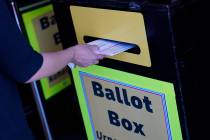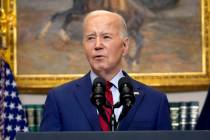Reform American health care now
I have done the research and am prepared to discuss the details of health care reform legislation. But there's little sense in going there if we can't agree on the answer to this basic question: Is medical care a privilege or a right?
I believe medical care is something that all men, women and children should be entitled to receive. A civilized nation, I submit, provides medical care to everybody, not just those who can afford it.
It is a privilege to drive a Porsche or to live in a house on the beach. These are luxuries enjoyed by those who have enough money to pay for them. The rest of us can get by just fine with our Fords and tract homes. We can even get along by riding the bus and living in apartments.
Medical care is different. It should not be available only to those who can afford it. We are all human beings, and we all suffer from conditions and diseases that can have painful and even deadly effects -- especially when they go untreated.
Long ago, we made some decisions in this country about rights and privileges. For example, youths who behave themselves have a right to an education. Children in every community in every state have access to the public schools. And they're free. (Yes, we pay taxes to fund the public schools, but no parents pay tuition for their kids to attend.)
Another example: police and fire protection. For decades, most if not all American communities have provided these services to anyone in need. If your house is in flames, the fire department will come to douse the blaze and rescue anyone trapped inside. They don't check your credit rating before deciding whether to save your house. If you are a crime victim, the police department will investigate and try to catch the perpetrator.
One more: Social Security. Since 1935, senior citizens who have worked during their lives, which is almost everybody, have been entitled to economic security -- or social insurance -- in their retirement years. We believe those who have worked hard for many decades should not have to suffer the ravages of poverty during the last leg of their lives.
These are accepted rights. We believe education is a essential precursor to becoming a productive citizen. We believe police and fire protection are needed to maintain order and safety. We believe economic security has been earned by the aged.
It's not clear to me why we haven't treated health care in this manner. Most other industrialized nations -- England, France, Canada, Sweden, etc. -- made the decision decades ago that medical care is a right and is therefore available to everyone.
What's more, other nations have figured out how to provide health care to everyone in a fairly efficient manner. The United States ranks a dismal 37th in terms of health care performance, according to the World Health Organization. We pay too much and get too little.
America's grand experiment in private health care has seen notable successes in the form of medical innovations and freedom of choice for patients. But in recent decades, the cost of our system has raged out of control. Today, millions of Americans lack health insurance because they cannot afford it or because pre-existing conditions prevent them from getting it. Others have insurance but are still bankrupted by exorbitant medical costs. Many doctors no longer enjoy their work, as they are focused on seeing as many patients as quickly as possible, rather than taking the time needed to provide quality care to each patient. In the bigger picture, our health care system is the most expensive on the planet, constituting at least 17 percent of our gross domestic product.
"Our current private health insurance system is the most costly, wasteful, complicated and bureaucratic in the world," says Sen. Bernie Sanders, I-Vt. These criticisms of the American system are not new or much disputed. Yet we haven't yet reached a consensus on what to do about it.
If an overwhelming majority of Americans saw health care as a right, we could simply create one system that covers everybody. We're getting closer to that viewpoint, but since we still are not there, President Obama and other reformers have outlined a compromise that could come close to achieving universal coverage anyway.
Their plan, in essence, would create a public health insurance program while giving people the option to keep their private plan. It would be your choice. The competition would be good for everybody, driving down administrative costs and improving care. The cleverness of the proposal is its simplicity.
This plan is far from ideal -- we'd still pale in comparison to Canadian health care, for example, which I believe would be the best model to reduce costs, improve overall health and achieve universal coverage. But the plan on the table would be a vast improvement over the absurd and unsustainable system we struggle with today.
Geoff Schumacher (gschumacher@reviewjournal.com) is the Review-Journal's director of community publications. His column appears Friday. Follow him on Twitter at twitter.com/geoffschumacher.























